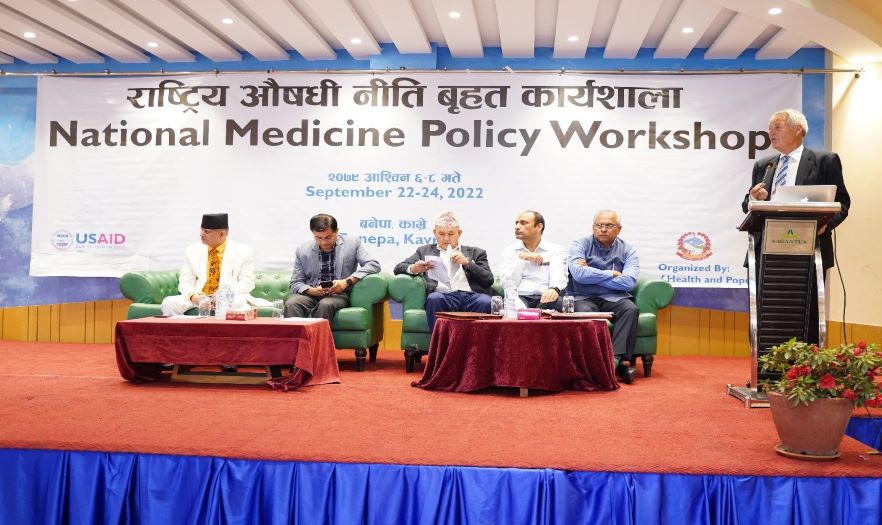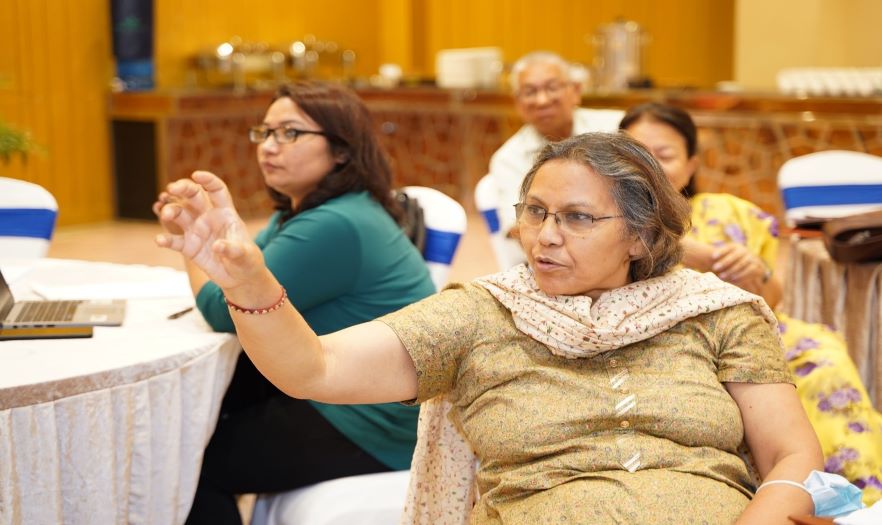Nepal Acts to Revise Its 1995 National Medicines Policy
Nepal Acts to Revise Its 1995 National Medicines Policy

Technical and advocacy support from the USAID Medicines, Technologies, and Pharmaceutical Services (MTaPS) Program—implemented by a consortium led by MSH—result in important health reforms.
In Nepal, the pharmaceutical market has expanded significantly over the past several years, but its policy and legislative framework to regulate the medical products on the market have severely lagged. Its 1995 National Drug Policy (NDP) is outdated, with many of its components still to be implemented, rendering its regulatory agency, the Department of Drug Administration (DDA) unable to effectively regulate the tens of thousands of medical products and devices on the market. Of the nearly 40,000 importers, distributors, pharmacies, and medicine outlets in the country, less than 10% have a licensed pharmacist.
In significant progress, a revised National Medicine Policy (NMP) is now taking final shape—a culmination of efforts led by the Ministry of Health and Population (MOHP), with technical and advocacy support provided by USAID through its Medicines, Technologies, and Pharmaceutical Services (MTaPS) program, led by Management Sciences for Health.
On September 22 and 23, 2022, a high-level National Medicines Policy Workshop, organized by the MOHP in partnership with MTaPS, convened over 70 policymakers and national stakeholders to review and discuss the policy options for improving the pharmaceutical sector over the next decade. The new NMP will support implementation of the National Health Policy 2019.
The workshop was attended by senior-level officials from the MOHP, provinces, and the DDA, and key stakeholders from the National Medicine Laboratory, academia, professional councils, pharmacy associations, domestic industries, medicine, and health technological product retailers, and wholesalers, pharmacists, consumers, and international partners.
The participants reviewed and agreed on the draft NMP and provided recommendations to further improve the policy, such as paying more attention to generic and veterinary medicines.
Five Policy Components Receive Endorsement
The conference participants endorsed five core NMP components for priority action:
- Urgently adopt the revised Drug Act, and reorganize and strengthen human resources of the DDA and expand its scope of work
- Provide technical and financial support to strengthen the DDA and the national laboratory as per WHO’s framework to increase the DDA’s maturity level
- Update the National List of Essential Medicines, linking it to standard treatment guidelines and using it to guide medicine procurement by the public sector and reimbursement by health insurance
- Increase public budget for free essential medicines
- Establish a Pharmaceutical Affairs Division in the MOHP to plan and oversee the many NMP components outside the scope of the DDA
“I appreciate all stakeholders for their efforts to prepare this draft policy despite many challenges. I am not an expert but seeing the urgency I will take in consideration for necessary amends and endorse the policy as soon as possible.”
Mr. Bhawani Prasad Khapung, Honorable Minister, Ministry of Health and Population, Nepal
Consultative Process and Advocacy Drive Policymaking
MTaPS aided the revision of NMP as part of its overarching support to the MOHP to strengthen the country’s pharmaceutical system. The policy formulation process entailed drafting of policy option analysis following stakeholder discussions facilitated by Prof. Hans Hogerzeil, an international medicine policy expert and former director of the WHO Department of Essential Medicines and Pharmaceutical Policies in Geneva. Over 200 experts and institutions in the country were consulted as part of the process: the MOHP; the DDA; the Ministry of Law, Justice, and Parliamentary Affairs; Association of Pharmaceutical Producers of Nepal; Nepal Chemists and Druggists Association; Association of Traditional Drug Manufacturers; Nepal Pharmaceutical Association; Pharmacy Association of Nepal; External Development Partners; Forum for Protection of Consumer Rights-Nepal; and other relevant government entities and stakeholders.

In conjunction, MTaPS has been working to revise the 1978 Drug Act, last updated in 2000, to bring the DDA’s practices in line with global best practices set forth by WHO for a mature, effectively functioning regulatory agency. The program continues to advocate for implementation of the new Drug and Health Product Act, which now includes health technological products and cosmetics for the first time in the country, along with a proposed reorganized structure with increased DDA staffing. The draft Drug and Health Product Bill was developed based on a gap analysis and after numerous discussions and inputs from DDA leadership and the legal committee. The draft bill was forwarded to the MOHP for their review and processing for forwarding to the cabinet secretariat and onward to the parliament.
Next Steps
The next steps include the finalization of the NMP with further inputs from stakeholders who were unbale to attend the conference, such as the Ministries of Finance and Education, and the national health insurance. The final Nepali text of the NMP will be submitted to the MOHP for cabinet approval.
The new NMP will provide the necessary government commitment for building the capacity of the DDA to function more effectively in regulating medical products on the market. The revised policy will also guide practical developments in the pharmaceutical sector so that the people of Nepal can have sustainable access to safe, quality-assured, and effective medicines and other medical products.